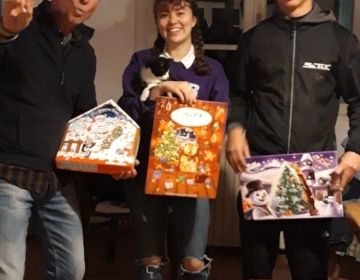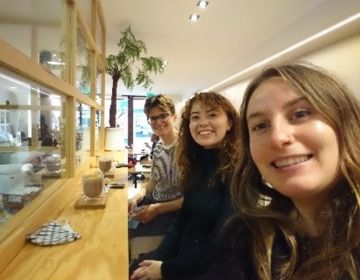Judaism in Toulouse
For about a year before leaving for Toulouse, I studied Hebrew and Judaism mostly through Zoom with a private tutor and another student close to my age. In our last visit together before I left, we spoke about the great Torah commentator Rashi, who was French. Arik, my tutor, advised me to take the train to Troyes, France, Rashi’s birthplace, to see the Rashi Memorial during my stay. If I couldn’t make it to Troyes, he said, I should keep up somehow with my Jewish learning: by visiting a synagogue in Toulouse, or by memorizing prayers, or simply by going to our Zoom meetings as much as I could.
One of the first people I met in Toulouse was Jewish. Two or so weeks into the program, looking for lunch between our intensive language class in the morning and a cultural activity planned for the afternoon, I wandered into one of the first cafés I saw near my homestay. A young man behind the counter was the only person inside. After I ordered, we both asked each other where the other was from. He said that he had come to Toulouse several years ago from a small town close to Tel Aviv, Israel, and had found a Jewish community here. I told him that I was Jewish myself, and for a little while we spoke about his experiences in Israel and France, and also about my stay with CIEE. I was so glad to have met someone I truly enjoyed speaking with--and also to have found a place with delicious sweet potato soup--just as my program was beginning. I was sure I would be back. But the following week, I saw a sign on the front door of the café which stated that they would be closed for the following three months due to financial difficulty caused by the pandemic.
For my first few weeks in Toulouse, I continued to meet with Arik and my peer through Zoom. I had always appreciated our meetings together and it was feasible for me to put aside an hour each Wednesday night to attend them. Soon, though, our meetings became less of a priority for me. I missed one because of confusion about daylight savings time; the next because of a poorly scheduled call with my brother. Along with language classes Monday through Friday, and cultural activities most days of the week, I had to go to the hospital multiple times because of a foot infection. Initially, I was uncomfortable in my language class and considered moving to a different one. And about two thirds of the way into the program, I had to move host families.
Though I was enjoying many aspects of the program, throughout this period--especially when I was in the process of moving families--I often had to slow myself down and acknowledge that I was stressed out. I would go for walks in the city and think about my situation and about how I could move forward. Or, I would talk to my mom, brother, and friends to get their take on what I was going through-and also because it made me feel better to hear news from back home. Isabelle, the directrice of the CIEE Toulouse program, was also helpful through her organizing and by hearing through the solutions I thought would be right for me while also giving me thoughtful advice. Still, I often didn’t feel totally happy.
A few weeks ago, having recently moved in to my new host family’s house, I realized that it was Wednesday, just moments before the scheduled meeting with Arik. Why not join? He and the other student were glad to see me for the first time in over a month, and I was glad to see them too. The other student was just weeks before her Bat Mitzvah ceremony; I didn’t mind being on the sidelines while she chanted prayers and talked through the last edits to her Drash. After she was finished, Arik asked me to stay on Zoom with him for a few minutes. He apologized for being out of touch, and so did I. He asked about my trip, and I told him about having to move host families. Going to the meeting and talking to him made me feel better somehow-like I was closer to myself, and that part of my identity had been reaffirmed.
Sitting in my room after the meeting, I thought more about my trip. Adjusting to living in a new country is not easy. It is a long process which can be disorienting; by definition it is unmooring. And that is precisely how I’d been feeling in the previous weeks: unmoored and out of touch with myself. In France, learning a new language, living with new people, I didn’t have enough of a connection with the more fundamental aspects of my identity--like my religion--which I always felt were a part of me when I was back home.
I thought back to my meeting I had with Arik just before I left. I couldn’t go to the Rashi Memorial because of covid lockdown restrictions, but I wanted to connect with Judaism. I found a synagogue close to my homestay, but showing up on a Saturday morning hoping to be able to attend a service, I was disappointed to find that it was closed. Then I remembered that a Zoom memorial for my grandmother who had passed away almost a year before, which would be led by Arik, was planned for the following weekend.
At this memorial, seeing the faces of my mother and brother for the first time in months--and those of some of my cousins, uncles, and aunts for the first time in over a year--even through Zoom, filled me with warmth. I loved my grandmother dearly, and celebrating her life through a Jewish ceremony made me feel more complete. I was pleased to say some words about her and listen to the stories of others.
Before I left for France, people told me that taking on a new character that would fit more into French culture would help me learn the language and have a more worthwhile stay. I’ve learned that, while abroad, making the time to also develop other parts of one's identity--which may not have anything to do with language or cultural immersion--is key to having a positive experience.
Related Posts
My Homestay Experience
In the months leading up to my departure for Toulouse, my mom and friends told me that speaking French everyday with my host family would be the best way to... keep reading

Studying Abroad in the Time of COVID-19
Based on an interview of Mia Merk, CIEE Gap student in Fall 2020 (September 28-December 19) in Toulouse, France As early as her Junior year of High School, Mia had... keep reading

From Onsite to Online Cultural Activities in Toulouse
AND…Life must go on! Since the beginning of November, France has been under lockdown again. This means, for CIEE staff and student, that the program keeps going on…line. GYA students... keep reading